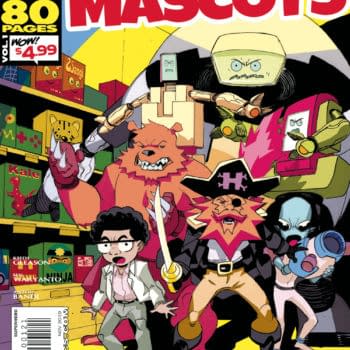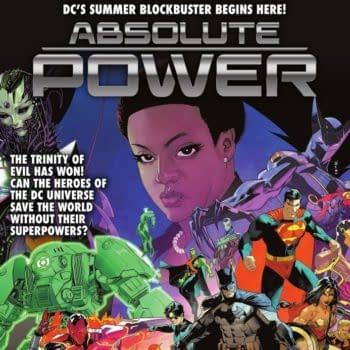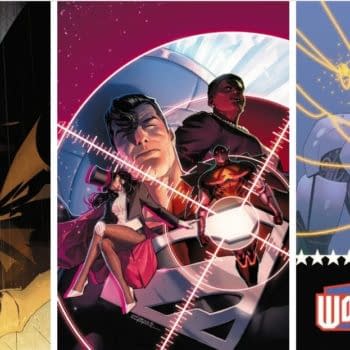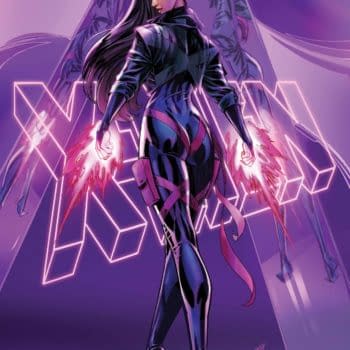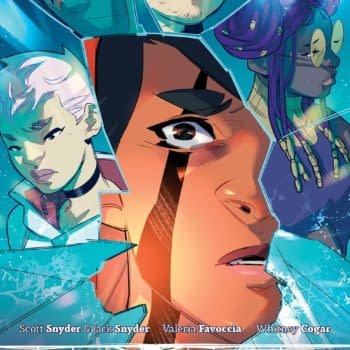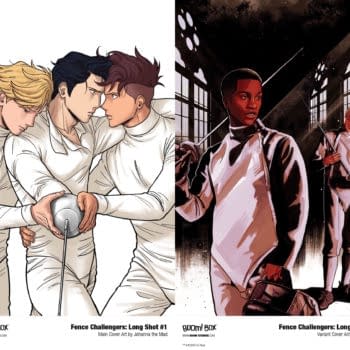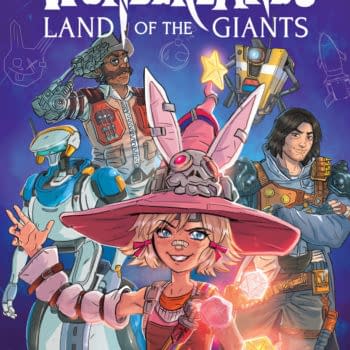Posted in: Comics, Recent Updates | Tagged: Comics, titanium rain
Talking With Josh Finney About Titanium Rain
Alasdair Stuart writes for Bleeding Cool
Titanium Rain, written by Josh Finney and with art by Josh and Kat Rocha, gained notoriety a little while ago when it was banned in China. The book does deal with a civil war in the country that becomes a global conflict, but there's no tub thumping here, just a fascinating piece of transhumanist science fiction that takes in everything from our profound love of flight to what it means to be human. I talked to Josh about the genesis of the book, its influences, how the creative team felt when the ban was announced and what's next for the men and women of Phoenix Squadron.
What were the inspirations behind Titanium Rain?
Ghost in the Shell.
Neuromancer.
And several hundred cups of coffee.
I suppose those are more "influences" rather than true inspiration, though. Actually, Titanium Rain's origin came out of a desire to tell an intelligent story that spoke to the troubles of our time. The first rumblings of this began around 2006, back in the dark days of the Bush Administration. At the time America was still coming to terms with the post-9-11 condition. We were mired in two wars, consumed by economic strife, and becoming bitterly aware of just how divided we are as a people. And all the while, helming this sinking ship was the "Great Decider", a cokehead dirtbag who played party politics in the worst ways and claimed to be in direct communication with god. Meanwhile, the best the so-called opposition could muster was to impersonate their favorite prophet, Michael Moore. Which is to say, they sat on their asses, got fat, and did a lot of finger waving. Frankly, I was sick of it.
But the real "moment" of inspiration came late one night while thinking about one of my personal heroes, Gene Roddenberry. I recalled the political climate in which he created Star Trek. Back then, there was a monster in the White House, too. The nation was divided, the country was at war, and nuclear annihilation was generally accepted as inevitable. Yet here came Roddenberry with Star Trek, a future in which mankind did nuke itself, yet still managed to rise out of the ashes to become something better than before. As cheesy as those old Trek episodes are, they resonated. They inspired legions of fans to become doctors, scientists, engineers, even diplomats; all of them journeying out into the world with a desire to realize Roddenberry's vision of a better humanity. Trek's impact on our culture as a force for progress is not only measurable, it's visible all around us. For all the doom-laden pessimistic ugliness that was gracing the big and small screen of the time –Soylent Green, No Blade of Grass, Future World– it was Trek's progressive vision that endured.
So I figured it was time I made my mark. I would pen a tale that would follow one pilot's journey through mankind's worst, only to discover its best.
Your point about the journey through the worst to the best is an interesting one, especially during the scene where Piso's name is carved on the Buddha. There's a collision between religion and pragmatism there I find fascinating and very moving in fact, given that it's coming from a character who isn't fully human, at least in the biological sense. How did your own beliefs in that regard influence your characters?
I'm an atheist, but I also find a lot of power in the stories of religion and mythology. To the true believer, they may see god in those words, or even literal events. What I see is a species striving for higher ideals. Why else would we create these stories/myths/gods? The same goes for Titanium Rain, for a person of faith, the Buddha statue represents God, for an atheist like me, it's the idea of God (or a higher order). And why Buddha? Because Zen itself is essentially an atheist philosophy. Then of course, I also used that scene to show how the Jade revolt attempted to wipe Buddhist teachings from their own culture.
Titanium Rain is an incredibly cinematic book. What were the visual influences on it?
The visual style seen in Titanium Rain was developed specifically for the book. Kat and I went through a lot of development on this. The first incarnations of the world had a sort of pseudo-anime look to it influenced by Ghost in the Shell. It didn't take long for us to determine the anime look softened it too much. The violence, especially, was too stylized and removed from reality. Titanium Rain is a war story. As someone who has experienced violence, it was vital to me the combat be ugly and hit the audience like a gut punch. This is what lead to the digital-realism style that we see in the book, which is deeply influenced by Ridley Scott's Blackhawk Down and Manoru Oshii's live action film, Avalon. I was especially impressed by how both films used color sepias in tandem with certain themes and moods.
For me, the visuals needed to capture that visceral surge that comes from being so very close to death. I don't know if that can ever actually be achieved in a semi-static medium like sequential art, but the desire has pervaded everything I do. Ever since my own assault, I've been haunted by the crystal awareness that came with watching my own life bleed out of me. The moment I realized I'd taken a bullet, I knew exactly what it meant to be alive. The price of this knowledge? The horrible reality that I was probably going to be dead within minutes due to blood loss. As I said, this haunts me. I suffer from PTSD. Situations and loud noises can send me into episodes, nightmares can be hell, yet I also find myself constantly seeking intense stimuli –horror & war films, shooting guns, documentaries that delve into the extremes of human nature. I'm continually trying to reach back into that darkness and feel pieces of the near-death experience again. Heavy elements of this appear in Titanium Rain.
I can really see the Oshii influence there. The book's got an interesting, cold, but fragile and human tone that is very much present in Oshii's movies. I'm curious, does working against such a huge plot canvas help you with characters or hinder?
Admittedly, before Titanium Rain I had never done a story on such a grand scale. For me, the real juggling act was never to lose sight of the characters and their personal journey while plunging the reader into World War Three. The trick was making each scene function on multiple levels. For every scene I wrote I'd return to it later and think, "how can I add another layer of thematic subtext or hidden exposition?" I know some readers expressed deep hatred for the poker scene, while others loved it. In the end, I'm quite proud of how much story is told there (rather seamlessly) in those eight pages. Another way I subliminally worked in the bigger ideas to make each pilot symbolize a different political/philosophical view point…
Alec: The intellectual left, atheism. Smart, but plagued by apathy.
Piso: Down-home Midwestern conservatism. Well meaning, but blinded by tradition.
Buffalo: Southern, religious conservative. Ultimately good, but crazier than shit.
Peanut: Urban black America. Just trying to keep his head low and survive.
Happy: The pragmatic realist. She sees past the dogma and calls it like it is.
Major Graves: I'd tell you what he symbolizes, but it'd ruin Part 2.
Each of their characters has a personal journey. Without revealing too much I'll say right now, for Alec it is going from being an apathetic intellectual to a Humanist who realizes there are things worth dying for.
The book's a very unusual combination of techno thriller and near future science fiction. Were there any ideas which didn't make it to the final series?
Yes and no. As far as Book One is concerned, the only thing that was scaled back was some of the action. While creating Titanium Rain, Archaia was still printing single issues, so each chapter had to fit into a 24 page format. It wasn't so much subject matter that got cut, but rather the number of pages spent portraying the combat. For the aerial battle, for instance, I would have loved an extra page or two to allow the art to breath. Some of the it feels a bit dense on the page. Also, space for a dramatic pause or two during the dialog-heavy scenes would have been nice. Really, in terms of the big ideas –geopolitics, technology, philosophical themes— the only limit was my desire to keep a tight, coherent narrative. At no point do I want the actual "story" to get mired in awkward, overwrought exposition. If a detail pulls the reader out of the moment, it doesn't belong in that moment. On the other hand, I was also aware some readers would have deep geek questions regarding the world I'd built. That's why I included the fifty extra pages of supplemental material in the back of graphic novel. As well, I love the concept of "assembled" storytelling. In those last fifty pages I'm essentially dropping a pile of documents and news clippings from the world of Titanium Rain into the reader's lap and allow them to explore. For anyone who is willing to take that journey, there are narratives waiting to be uncovered and pieced together.
The book has a refreshingly pragmatic, boots on the ground approach to the politics of the war. What influenced that choice?
What influenced that choice? A few things, the first being Mamoru Oshii, director of films such as Ghost in the Shell, Avalon, and Sky Crawlers. I was blown away by how Oshii could construct films that were deeply philosophical, yet always kept their focus on the people caught in the middle of all hell breaking loose. Another huge influence has been HBO's mini-series, Generation Kill. The down and dirty honesty of that series was groundbreaking. It single handedly encapsulated the culture and experience of the USMC without being heavy handed, preachy, or cliché.
There was also a personal aspect to the politics of Titanium Rain. Understand, the household I grew up in was extremely liberal. My parents were very much children of the 1960s, and with that came quite a bit of baggage –the most pronounced being rather unrealistic ideas regarding conflict and the military. The constant message was that violence was never the answer, the military was evil, and anyone who served was a either a bloodthirsty killer or a suckered dupe. Later, in college, I worked for a number of Peace Groups in San Francisco. What I encountered there were views even more out of touch with reality. The accepted fantasy was that America was the source of all conflict in the world and peace could be immediately achieved by simply dismantling our military. Oh yeah, and again, all soldiers were either sicko baby killers and/or minorities who needed the money. The concept that anyone would actually serve their country out of a sense of duty or sacrifice was completely alien.
Then 9-11 happened.
The day the towers went down I had friends in the "peace" movement who were thrilled. And even those who weren't celebrating the carnage were at least parroting the "we deserved it" rhetoric. Even now, thinking back to some of the phone calls received afterward, my stomach starts to turn. I mean, three thousand people died that day and I had friends who were happy about it. Now, granted I do believe that Gen-X is slowly freeing the Left of its ridiculous love affair with the myth of the 1960s, but my point is we need to stop looking at the "establishment" as the enemy. It is vital we remain involved and invested in this country's well being. If your only solution to every problem is to tear down the system suddenly the actions of asshole like Timothy McVey and the 9-11 hijackers start making sense.
With Titanium Rain I aim to crush the myths and misconceptions that have been seeded into our culture since the 60′s. Radicalism isn't cool, blind devotion is nothing to be proud of, and ultimately, it all routes back to mindless fanaticism. Nature won't provide. Man and technology are inseparable. Stepping backwards isn't going to fix our problems, nor is dismantling society. And like it or not, war is going to happen. In times of crisis we need cool, intelligent minds wielding America's sword. Yet the Left has become so anti-military that we've effectively removed ourselves from the discussion. By and large, liberals don't serve, don't become officers, and frankly, a lot of them refuse to acknowledge that sometimes diplomacy just isn't an option. Essentially we've handed America's might over to the party of Cheney and Rove. And just so we're all clear, I view myself as a Roosevelt-style Democrat. FDR is another of my personal heroes.
Anyway, at its heart, Titanium Rain is about sending a Humanist message. It is an argument for reason over irrationality. Civilization over tribalism. Innovation over ignorance. We must rise to the challenges before us. Submitting to whatever nature/god/chaos hands us is not an option. Like every other successful link in the evolutionary chain we must choose to climb up out of the muck and strive to become something more.
The idea of 'something more' is fascinating, especially in light of the augmentations the pilots undergo. Do you think the future lies in that direction? Biological and cybernetic customization?
I suppose that gets into the symbolism again. By "something more" I mean that we as a species are driven to reach farther, do better, and escape the harsh realities of the natural world. For Titanium Rain the modifying of the pilots symbolizes this. In reality, technology is just one manifestation of humanity's drive to ascend. There are also social constructs like civilization, religion, law, and war. Yes. You read that right. War is actually a sign of progress. As ugly and as awful as it is, war is a human concept designed to mitigate the destructive nature of conflict. Think about that. Couple hundred years ago the concept of non-combatants would have been laughed at. Or what of collateral damage? Sure it happens, but it's recognized as terrible and to be avoided. In the west people react in horror when a school or hospital is razed in a bombing. In the Middle Ages, killing peasants and torching villages was considered bonus points.
Despite all anti-human sentiment we're getting now days (James Cameron's Avatar, anyone?), there is a lot we've done right. We are progressing forward. I truly believe this modern trend of claiming Earth would be better off without us is an excuse by those who want to abrogate their responsibility as human beings –to the planet and to each other. Ever since the 60's failed to deliver utopia, a lot of Americans have sought security in the promise of there being no future. Don't worry, be happy. The world's better off without us anyway! So why not snort coke and party until we burn? Or Jesus comes back, or both. I do not accept this, and neither should anybody reading this. Enter Alec's role as an intellectual plagued by apathy, and his journey toward Humanism.
As for the reality of transhumanism being the next stage of human evolution? Here is something to consider: simple tools pre-date human beings. Furthermore, humanity would have NEVER evolved if it weren't for those tools. Therefore, technology shaped us. Our symbiosis with machines started at day one. This whole myth about how mankind has somehow deviated from nature is utter bullshit. We build. We innovate. We seek to shape the world around us. The man-machine interface is our natural state. Will we become smarter, healthier, more connected cyber organic beings? I damn well hope so. The point is we need to stop waiting for nature or god or the universe to provide, and accept the responsibility that comes with being the advanced creatures we are. By the way, take note that in Titanium Rain, the Jade revolt is all about returning to a feudalistic past fueled by myths of an agrarian utopia.
What led to the decision to setting the book in the near future?
I suppose with a few tweaks Titanium Rain could be scaled back and set in modern day, but the story functions better as a futuristic tale. First, because much of the technology in the book doesn't quite exist yet…this certainly becomes more pronounced in books 2 & 3. And second, because setting the story twenty years from now (and in an alternate time line) allows distance enough for the reader to step back and look at the events portrayed without the typical sociopolitical baggage that comes with a Tom Clancy novel…and for the record, no, I'm not a fan.
Also, something I must stress about Titanium Rain is that my goal has never been to "predict" anything. Make no mistake, I am a writer of fiction. What matters are the deeper themes in my stories and how they relate to us now. Much of what is portrayed, especially the stuff regarding China, was based on the historical past more than anything else. Particularly, the Boxer Rebellion. Why a civil war in China? Why not some apocalyptic war in the Middle East? Because it didn't fit the story I was looking to tell. For Titanium Rain I needed a war scenario that wasn't obvious, yet believable enough. Thus China.
Plus, if anyone really wants to see Josh Finney tackle the Middle East there's always Eckert's story in Utopiates. I'll tell you this, if you think I'm hard on the Left in this interview, you should see what I have to say about the dim bulbs on the Right. That story in particular pulls no punches in regards to the Bush / Cheney legacy. Hmmm…maybe we should talk a bit more about the sci-fi/human elements of my works. At this point I'm afraid your readers might be getting the false impression my stuff is all political tirades masquerading as stories, ala Brian Wood.
What led to the production of the audio drama?
The first seeds of the audio drama came about at Comic Con 2010, actually. I was signing at my publisher's booth when out of the crowd came a man I could've sworn was cult horror legend Reggie Bannister of Phantasm fame. It's Comic Con. Reggie is a regular at the autograph pavilion. It wasn't a huge leap. I mean, Seth Green is a regular at the Archaia booth. Why not Reggie? Anyway, things got exponentially weirder when "Reggie" walked up and asked me if I'd ever considered turning one of my stories into an audio play. "Yes! Yes I have," I told him. "In fact, I've already commissioned soundtracks for Utopiates and Titanium Rain! By a professional composer from the BBC, no less!" Reggie looked at me like I'm crazy, or at least full of shit. Then I add, "In fact, one of my first attempts to break in as a professional writer was submitting scripts to Big Finish Productions!" Reggie pauses for a second, then replies, "That's great! You'd be working with Bill Dufris! He was Judge Cal in the Big Finish Judge Dredd audios!"
Well, it turns out I wasn't speaking to cult horror legend Reggie Bannister, but rather Lance Axt of the Audio Comics Company...who looks strikingly like Reggie. Of course, now Lance is going to kill me for saying that publicly, but…er…yeah…
How did you find out about the graphic novel being banned in China? How did it make you feel?
When I got the nervous phone call from my editor informing me of the situation, honestly my first reaction was laughter. The situation was so ludicrous, yet so in character for the Chinese government. I mean, these guys are undoubtedly the rising superpower of the new millennium, a geo-political force that keeps world leaders up at night, and yet they're freaking out over my graphic novel that's got a print run of less than 15,000 copies?! I mean, c'mon…even the religious nuts here in America aren't that thin skinned. The thing is, I can't tell you exactly what it was that upset the Chinese government so much. The two phrases we kept hearing on why the book was banned were, "political content" and oddly enough, "pornographic." Of course, there's no lurid sex scenes until the yet to be published book 2, so I don't know where they got "pornographic" from.
Sure, Titanium Rain does deal with some heavy political topics, but it's ultimately a work of speculative fiction. Heavy emphasis on the word fiction. And more to the point, the antagonist faction in the story is not the current Chinese government. It's a radical group of ethnic purists in the military. Then again, maybe that's what China found so objectionable. In the story Kao-Shen justifies his rise to power with a lot of the same nationalist rhetoric the current government is so fond of. Maybe the idea that someday that rhetoric could be turned against them is frightening enough to get my book banned. And for that matter, it wasn't just Titanium Rain the PRC banned. My wife and I are also barred from entering the country. Likewise, my publisher, Archaia Entertainment, can no longer do business in China. Before the controversy Archaia had printed nearly all of its books there.
Tell us a little about the future of the book. What's its current status and where does it go next?
Titanium Rain has always been envisioned as a three part series. Book One was about introducing the characters, world, and setting the stage for the bigger ideas to come. Book Two raises the stakes, puts some of those big ideas to the test, and explores the notion that stark poverty is possibly the most dangerous weapon of all. We also learn some rather shocking things about the true nature of the Prometheus Initiative. As for book three? One word: Transhumanism.
As for when the next book will become available, it's hard to say. Titanium Rain Vol. 2 is finished, and has been awaiting print since December 2010. Without getting too deep into why this is, what I can say is that when you sign with a publisher there are certain realities one must accept. You are no longer the sole master of your story's fate. Disagreements happen, complications arise. Thus, Titanium Rain Vol. 2 is in publishing limbo…for now. On the other hand, from what my fellow creators have been saying, there's been a major regime change up top over at Archaia Entertainment. If this is indeed true, things could change rapidly. Either way, I'm optimistic that things will get sorted out, eventually.
Whatever the book's ultimate fate may be, the story WILL continue to be told. Thanks to the fine people at the Audio Comics Company, all three installments of Titanium Rain will be translated to full cast audio dramas. As mentioned, Part 1 is already available (www.TitaniumRainAudio.com) and we'll begin recoding Part 2 this November. I've been a life long fan of audio drama and the job the Audio Comics Company did with the first installment of Titanium Rain was nothing short of amazing. Plus, it didn't hurt that the whole thing was scored by a professional BBC soundtrack artist, Jonathan Sharp. The soundtrack was straight-up movie quality, which did a lot for the action.
Also don't be surprised if Titanium Rain also gets a novelization.
Titanium Rain, as well as the excellent audio adaptation of it, is available now. Also available, and also worth your time is Josh and Kat's excellent Cyberpunk graphic novel, Utopiates. See the 01 Publishing site for details.


